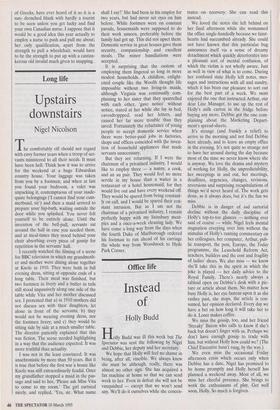Long life
Upstairs downstairs
Nigel Nicolson
The comfortably off should not regard with envy former years when a troop of ser- vants ministered to all their needs. It must have been hell. Think how it was to arrive for the weekend at a huge Edwardian country house. Your luggage was taken from you by a footman, and when at last you found your bedroom, a valet was unpacking it, contemptuous of your inade- quate belongings CI cannot find your cum- merbund, sir') and then a maid arrived to prepare your hip-bath, waiting outside the door while you splashed. You never felt yourself to be entirely alone. Until the invention of the bell-pull, servants sat around the hall in case you needed them, and at meal-times they stood behind your chair absorbing every piece of gossip for repetition in the servants' hall.
I recently watched the filming of a scene for BBC television in which my grandmoth- er and mother were dining alone together at Knole in 1910. They were both in full evening dress, sitting at opposite ends of a long table. Their meal was finished, but two footmen in livery and a butler in tails still stood impassively along one side of the table while Vita and her mother discussed sex. I protested that a) in 1910 mothers did not discuss sex with their daughters, let alone in front of the servants; b) they would not be wearing evening dress, nor the footmen livery; and c) they would be sitting side by side at a much smaller table. The director patiently explained that this was fiction. The scene needed highlighting in a way that the audience expected. It was more truthful than actuality.
I was not in the least convinced. It was anachronistic by more than 50 years. But it is true that before the first war a house like Knole was still extraordinarily feudal. Once my grandfather stopped a maid in the pas- sage and said to her, 'Please ask Miss Vita to come to my room.' The girl curtsied nicely, and replied, 'Yes, sir. What name shall I say?' She had been in his employ for two years, but had never set eyes on him before. While footmen were on constant parade, housemaids were supposed to do their work unseen, preferably before the family had got up. This did not upset them. Domestic service in great houses gave them security, companionship and excellent meals. The minor humiliations were accepted.
It is surprising that the custom of employing them lingered so long in more modest households. A childless, enlight- ened couple like the Woolfs thought life impossible without two living-in maids, although Virginia was continually com- plaining to her sister that they quarrelled with each other, 'gave notice' without notice, stared at her while she lay in bed, eavesdroppped, read her letters, and caused her far more trouble than they saved. Fortunately the reluctance of young people to accept domestic service when there were better-paid jobs in factories, shops and offices coincided with the inven- tion of household appliances that made servants unnecessary.
But they are returning. If I were the chairman of a privatised industry, I would like to employ three — a nanny, a cook, and an au pair. They would feel no more servile in my house than a waiter in a restaurant or a hotel housemaid, for they would live out and have every weekend off. They would be spared from being constant- ly on call, and I would be spared their con- stant intrusion. But as I am not the chairman of a privatised industry, I remain perfectly happy with my Sainsbury meat- pies and a once-a-week cleaning lady. We have come a long way from the days when the fourth Duke of Marlborough ordered his footman to run ahead of his carriage the whole way from Woodstock to Hyde Park Corner.


























































 Previous page
Previous page